Diesel vehicles are roughly Rs 1.20 lakh more expensive than their petrol counterparts.
So, if a car is sparingly used then the additional amount spent on acquiring a diesel vehicle is not worth it. However, if one cannot afford a diesel vehicle then the option of fitting CNG or LPG kits in petrol cars is a more cost effective solution for economical motoring.
The acceptance of diesel vehicles has witnessed a rapid rise in the last decade in India. With the advent of new technologies such as common rail direct injection, EGR systems and exhaust treatment systems, diesels today offer great performance, excellent mileage and on many accounts it is the cleaner fuel! The inherent ability of diesel engines to produce excellent low end torque makes for great driving; however these factors basically aided diesel engines to gain an acceptance in the passenger car market as they didn't spew black smoke like in the past. The icing on the cake however has to do with the pricing of fuel. Assuming Diesel is priced at around Rs. 50/litre and petrol is approximately Rs. 70/litre. The rates change in different parts of the country; however the ratio of difference between the two is more or less the same. It is the cumulative knowledge of all these facts that make diesel engined passenger vehicles the number one choice for many customers, however there is a chink in the diesel armour and that has to do with the pricing of the vehicle as compared to its petrol counterpart.
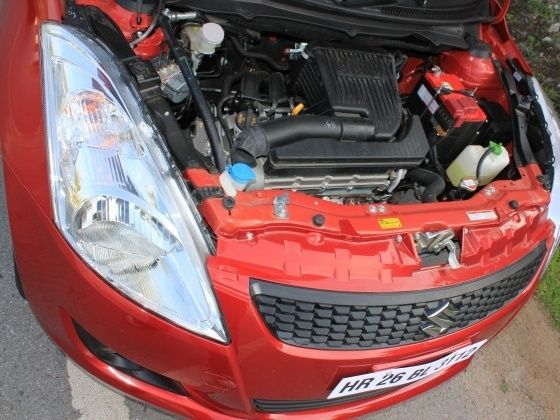
Note: The study is based under the following assumptions:
1. Costs of Petrol and diesel are for representational purposes only
2. The difference in price of petrol and diesel remains constant throughout the five years.
3. Cost of repairs and maintenance on both the variants remains nil or equal.
4. Both the variants will bring in 50% of the cost at the time of resale
5. Average driving is 15,000kms/year for both the variants. (in case 2)
6. The car model under consideration is the new Maruti Suzuki Swift (entry level variants for both diesel and petrol). This is only indicative, and gives a good idea since the difference of cost between petrol and diesel variants of other cars also hovers around the same figure.
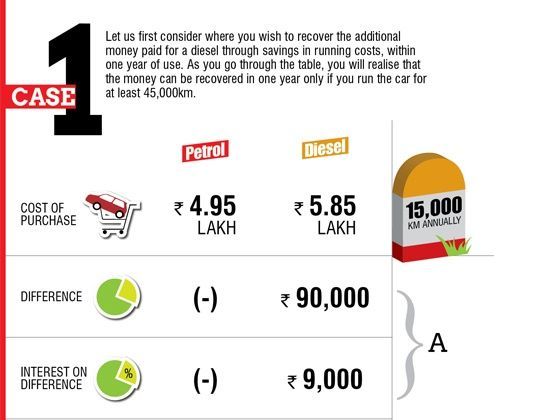
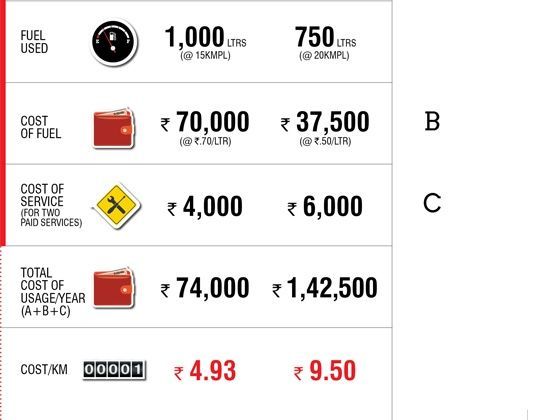
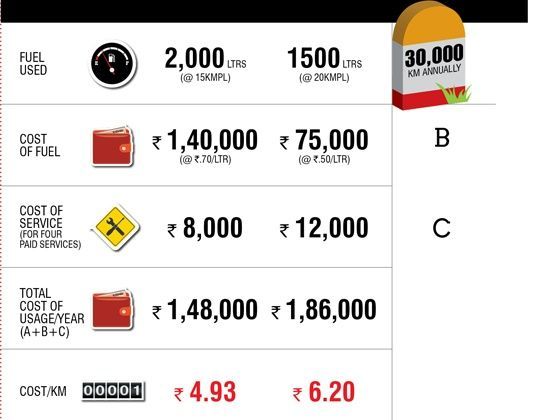
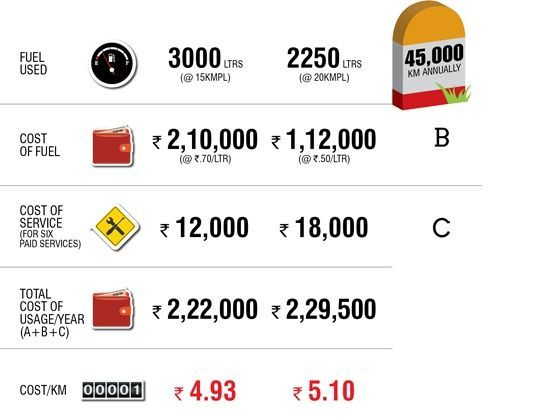 We did the math to compare the cost of operation for an entry level Maruti Suzuki Swift petrol with the diesel variant. The difference in the cost of the two variants is Rs. 90,000 with diesel being the more expensive of the two; add to that the interest one would gain on the excess amount at 10% p.a if the petrol variant was purchased. The diesel variant being more efficient and the cost of diesel being Rs. 20/litre lesser than that of petrol, it saves a lot of expenses on fuel (See Case 1), but the cost of regular maintenance of the diesel variant is higher than that of its petrol equivalent. Taking all these dynamics into account, the running cost of a petrol car comes to approximately Rs. 4.93/km in comparison to Rs. 9.5/km for the diesel if both the vehicles are run for 15000kms annually. Increasing the annual mileage put on the odometer, the diesel is at par with the petrol variant if and only if a person does a minimum of 45,000kms annually.
We did the math to compare the cost of operation for an entry level Maruti Suzuki Swift petrol with the diesel variant. The difference in the cost of the two variants is Rs. 90,000 with diesel being the more expensive of the two; add to that the interest one would gain on the excess amount at 10% p.a if the petrol variant was purchased. The diesel variant being more efficient and the cost of diesel being Rs. 20/litre lesser than that of petrol, it saves a lot of expenses on fuel (See Case 1), but the cost of regular maintenance of the diesel variant is higher than that of its petrol equivalent. Taking all these dynamics into account, the running cost of a petrol car comes to approximately Rs. 4.93/km in comparison to Rs. 9.5/km for the diesel if both the vehicles are run for 15000kms annually. Increasing the annual mileage put on the odometer, the diesel is at par with the petrol variant if and only if a person does a minimum of 45,000kms annually.
It is not just the thirst for fuel of petrol cars that brings diesel vehicles into the lime light. The numbers before you clearly state, that you should consider buying a diesel only if your monthly run exceeds a 1000 kilometres. In fact our thesis was endorsed by Toyota at the recent launch of the Etios and Liva diesels, where they made it very clear that for a diesel to start looking rosy; one has to run it for nearly 2000kms a month. The numbers are before you, so remember that with a diesel, you would still be paying that extra cash for the first three-four years of running for the satisfaction of driving a diesel. It still is a case of different strokes for different folks, and choice still remains in the hands of the buyer. Hope this article helps you make a more informed one. - Source: zigwheels
So, if a car is sparingly used then the additional amount spent on acquiring a diesel vehicle is not worth it. However, if one cannot afford a diesel vehicle then the option of fitting CNG or LPG kits in petrol cars is a more cost effective solution for economical motoring.
The acceptance of diesel vehicles has witnessed a rapid rise in the last decade in India. With the advent of new technologies such as common rail direct injection, EGR systems and exhaust treatment systems, diesels today offer great performance, excellent mileage and on many accounts it is the cleaner fuel! The inherent ability of diesel engines to produce excellent low end torque makes for great driving; however these factors basically aided diesel engines to gain an acceptance in the passenger car market as they didn't spew black smoke like in the past. The icing on the cake however has to do with the pricing of fuel. Assuming Diesel is priced at around Rs. 50/litre and petrol is approximately Rs. 70/litre. The rates change in different parts of the country; however the ratio of difference between the two is more or less the same. It is the cumulative knowledge of all these facts that make diesel engined passenger vehicles the number one choice for many customers, however there is a chink in the diesel armour and that has to do with the pricing of the vehicle as compared to its petrol counterpart.

New Maruti Suzuki Swift VVT
A deeper insight is required while trying to decipher the cost benefit between diesel and petrol vehicle variants. Elements such as the timeline of usage, cost difference between the two models, fuel price disparity, maintenance expenses and service charges, parts wear and tear and depreciation costs sum up the major list to assist in calculating the actual benefit. It is a line of thought that most customers overlook, however our cost-benefit study should shed some light on the topic and hopefully help customers make a more informed decision, rather than just going with gut instinct or following the claims of manufacturers.
Note: The study is based under the following assumptions:
1. Costs of Petrol and diesel are for representational purposes only
2. The difference in price of petrol and diesel remains constant throughout the five years.
3. Cost of repairs and maintenance on both the variants remains nil or equal.
4. Both the variants will bring in 50% of the cost at the time of resale
5. Average driving is 15,000kms/year for both the variants. (in case 2)
6. The car model under consideration is the new Maruti Suzuki Swift (entry level variants for both diesel and petrol). This is only indicative, and gives a good idea since the difference of cost between petrol and diesel variants of other cars also hovers around the same figure.




It is not just the thirst for fuel of petrol cars that brings diesel vehicles into the lime light. The numbers before you clearly state, that you should consider buying a diesel only if your monthly run exceeds a 1000 kilometres. In fact our thesis was endorsed by Toyota at the recent launch of the Etios and Liva diesels, where they made it very clear that for a diesel to start looking rosy; one has to run it for nearly 2000kms a month. The numbers are before you, so remember that with a diesel, you would still be paying that extra cash for the first three-four years of running for the satisfaction of driving a diesel. It still is a case of different strokes for different folks, and choice still remains in the hands of the buyer. Hope this article helps you make a more informed one. - Source: zigwheels